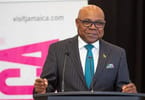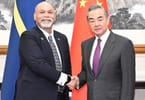MALABO, Equatorial Guinea – With 60% of the vote counted, Equatorial Guinea’s voters appeared to give overwhelming approval to a set of constitutional reforms proposed by the government, according to the Minister of Internal Affairs and Local Corporations and Chairman of the National Electoral Board, Clemente Engonga Nguema Onguene.
In a press conference held yesterday, Mr. Nguema said that a total of 230,930 votes had been cast in favor of reform and 2,236 against. Citizens voting overseas at Equatorial Guinea’s diplomatic missions voted 4,934 voted in favor and 36 against.
“The government did a national census this year to get the most updated population information,” said the Minister of Planning, Public Investment and Economic Development, Jose Ela Oyana, who accompanied Minister Onguene to the press conference.
The voting process was reported to be fairly typical. There were stands in every town with a printed list of names. When people arrived at the stand, they showed their documentation to poll workers, who found their name on the voter list and handed a ballot to the voter. The people voted in a private booth and then folded their ballot and placed it in a clear box in front of the table attendant. To conclude the voting process, each individual placed his or her fingerprint on a voting receipt in order to prevent anyone from voting twice.
“This procedure was done to represent the government’s transparency,” said Chairman Onguene. “We wanted to ensure that it was fair.”
The final results of the vote will be announced on November 15, 2011 after the counting of all votes is completed.
WHAT TO TAKE AWAY FROM THIS ARTICLE:
- With 60% of the vote counted, Equatorial Guinea’s voters appeared to give overwhelming approval to a set of constitutional reforms proposed by the government, according to the Minister of Internal Affairs and Local Corporations and Chairman of the National Electoral Board, Clemente Engonga Nguema Onguene.
- The people voted in a private booth and then folded their ballot and placed it in a clear box in front of the table attendant.
- When people arrived at the stand, they showed their documentation to poll workers, who found their name on the voter list and handed a ballot to the voter.






















